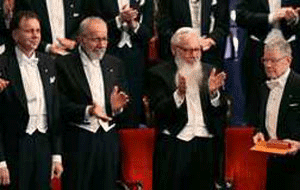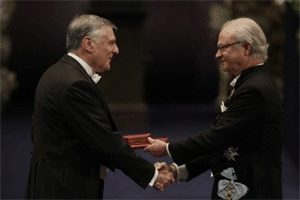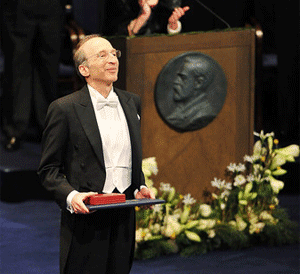Jewish Biographies: Nobel Prize Laureates
(1901-2018)
Between 1901 and 2018, the Nobel Prize has been awarded to more than 900 individuals and organizations. At least 203 of them have been Jewish.
Israel has produced a disproportionate number of Nobel Prize winners. In August 2015, Times Higher Education ranked Israel the fifth best performer this century based on the number of Nobel Prizes won as well as the significance and prestige of each one. The publication also ranked global universities based on Nobel Prize winners and the Technion-Israel Institute of Technology placed eighth, higher on the list than Harvard and every British University.
Notes:
^ - Pasternak was forced to decline the prize by the Soviet Union
* - Jewish father, non-Jewish mother
° - Anfinsen converted to Judaism later in life; Cori converted to Roman Catholicism
The State of the Jewish people, founded in 1948. Also; a name given to the Jewish patriarch Jacob according to Genesis 32.38. In Jewish biblical times, this name refers to the northern tribes, but also to the entire nation. Historically, Jews have continued to regard themselves as the true continuation of the ancient Israelite national-religious community. In modern times, it also refers to the political state of Israel.
(Heb. Yitzchak) One of the Israelite patriarchs, the son of Abraham and father of Jacob in the accounts in the book of Genesis.
Patriarch recognized as the founder of monotheism, Abraham is respected in all three primary monotheistic faiths (Judaism, Christianity and Islam). Presumed to have lived sometime in the period 2000-1700 B.C. E., Abraham was the father of Ishmael (progenitor of Islam) through his wife Hagar, and of Isaac (progenitor of Judaism) by his wife Sarah. (See also Genesis 12-25 [Old Testament]; Galatians 3-4 [New Testament]; and Quran 37. 83-113, 2.124-140).
One of the Israelite patriarchs, the son of Isaac and grandson of Abraham in the accounts in the book of Genesis. See also Israel.
(Heb. Yochanan, meaning God is Merciful) A common first name. In Christianity, it is often used to refer to John the Baptist or John the Apostle.
See kohen.
An angel or archangel, who according to Jewish tradition is said to have been the voice that told Noah to gather the animals before the great flood; the invisible force that prevented Abraham from slaying Isaac; the invisible force that wrestled with Jacob; and the voice of the burning bush. Gabriel is also mentioned in Christian tradition in regards to story of the virgin birth of Jesus, as well as with the revelation of the Quran in Islam.
(Heb. Human or Man) Name given to the first male in the creation story contained in the Jewish scriptures (Genesis 1). Adam has been interpreted over the centuries both literally (as an actual historical person) and symbolically (as generic humankind); (See also "allegory").
Oldest of the three primary monotheistic faiths; Judaism traces it's philosophy and tradition through the Torah and cultural roots to the Land of Israel.







No comments:
Post a Comment